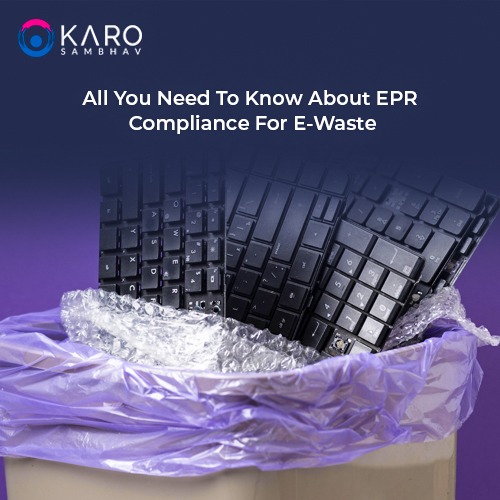Importance of EPR Compliance for Producers, Importers, and Brand Owners
A key idea in waste management is Extended Producer Responsibility (EPR), which transfers responsibility for proper recycling and disposal to manufacturers, importers, and brand owners. In recent years, the importance of EPR compliance has increased dramatically, supporting environmental sustainability and being in line with India's will to address its waste management issues.
Environmental Stewardship: EPR compliance is evidence of manufacturers', importers', and brand owners' dedication to environmental care. These organisations lessen their environmental effect and the threat of pollution and careless disposal by actively engaging in ethical waste management methods.
Reducing Landfill Burden: Overflowing landfills are a growing problem in India, causing serious environmental deterioration. Producers and brand owners are held accountable for the whole lifecycle of their products, including final disposal, thanks to EPR compliance. By considerably reducing the load on landfills, this strategy fosters a waste management ecosystem that is more sustainable.
Encouraging Circular Economy: The shift to circular economy—where goods are created, utilised, and recycled in a closed loop—is facilitated by EPR compliance. Circular economy promotes resource continual usage, minimising waste formation and pressure on raw materials, as opposed to a linear approach that leads to disposal.
Consumer Awareness: To educate customers about responsible consumption and disposal, EPR compliance is essential. Producers and brand owners who openly adopt EPR principles convey to consumers how important it is to make environmentally friendly decisions. Consumer behaviour is then influenced by this awareness to adopt more environmentally friendly habits.
Legal Obligation: EPR compliance is now required by law in India, rather than just being a recommendation. Companies that own brands, importers, and producers must follow the government's EPR guidelines. Penalties and legal repercussions may arise from breaking these regulations.
Waste Segregation and Recycling: To comply with the EPRA, systems for efficient waste segregation and recycling must be put in place. Manufacturers and brand owners are required to put in place mechanisms that make it easier for their products to be disposed of and recycled properly. Consequently, this helps to build a strong infrastructure for waste management.
Reducing Governmental Burden: Producers, importers, and brand owners reduce the load on government authorities by taking on waste management duties. This keeps waste management a joint endeavour between the public and commercial sectors while enabling authorities to reallocate resources to more pressing problems.
Increasing Corporate Reputation: Producers and brand owners can benefit from EPR compliance beyond just meeting legal requirements. It is a chance to improve their company's reputation. Customers are becoming more aware of how the items they consume affect the environment, and adhering to EPR principles can improve a business's reputation as a socially conscientious organisation.
Creating Economic Opportunities: The waste management industry has more financial opportunities because of EPR compliance. Producers and brand owners can work together with recycling centres and waste management companies to further the development of circular and sustainable economy.
International
Best Practices:
Following EPR compliance puts firms in line with global best practices in an
increasingly interconnected environment. Companies that adopt responsible waste
management are better positioned to negotiate global marketplaces and appeal to
a wider consumer base as sustainability becomes a universal concern.



Comments
Post a Comment